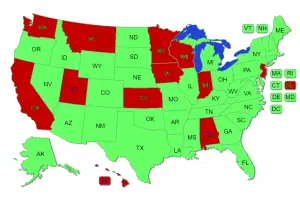
Fundraising raffles and sweepstakes have one main thing in common: they both give donors a chance to win a prize or prizes in exchange for a donation. Fundraising raffles and sweepstakes can be a great, easy way for nonprofits to raise funds online. There are a lot of restrictions, however, and oftentimes, organizations are unaware of these restrictions and the differences between these two types of fundraising campaigns. Let us break it down for you.

Fundraising Raffles
The primary difference between the two types of campaigns is how they’re legally regulated. Raffles are more geographically restricted than fundraising sweepstakes.
Legal Considerations for US Raffles
Federal government regulators consider raffles a form of gambling since donors pay in exchange for a chance to win something – just as you’d do at a casino. Raffles are regulated by the State Attorney General’s office.

- Raffles for charitable purposes may be allowed at the federal level for 501(c) organizations.
- Organizations conducting raffles must comply with state and local raffle laws and regulations.
- Several states prohibit online raffles, making it difficult to run an interstate raffle and impossible to run one nationally. If your organization is fundraising in one of those states, you won’t be able to set up an online raffle on our platform.
Legal Considerations for Canadian Raffles
Charity raffles are also regulated by the province in Canada. Please consult your legal counsel before publishing and running your raffle or lottery to ensure that it complies with all laws and regulations in your country and jurisdiction.
Legal Considerations for UK-Based Raffles
The Gambling Commission controls charity lotteries and raffles in the UK. Many individuals, organisations, and groups can set up raffles to raise donations for their chosen UK charity. We’ve included all the details in this blog on the legalities of UK-based raffles.
DoJiggy Provides Free, Donor-Friendly
Raffle and Sweepstakes Fundraising Websites

Fundraising Sweepstakes
Fundraising sweepstakes generally have fewer geographic regulatory restrictions than raffles, and entries can be sold nationally or even internationally. So when organizations have a goal of extending to a wider audience, fundraising sweepstakes can often have a further reach.

While sweepstakes allow organizations to reach a vast audience because of the lessened geographical restrictions, a free method of entry must be offered in addition to donation-based entries.
Legal Considerations for Sweepstakes
Fundraising sweepstakes are not considered a gambling activity in the same way that raffles are because of the free form of entry (you generally can’t gamble in a casino for free).
- There are limitations on free entries, e.g. one entry per person, to prevent abuse. But keep in mind that participants who enter for free are still learning about your organization as they participate.
- Sweepstakes do not allow a 50/50 or split the pot type format like raffles.
- They do not allow a limited number of entries since organizations must offer free entries.
Official Rules are Required

Sweepstakes require the posting of official rules. Within the official rules is an eligibility section that specifies who is eligible to win the prize. Eligibility can extend to countries, states, local areas, or even to a company’s employees.
Our software includes default official rules that are legally compliant for a global drawing. Organizers can limit sweepstakes eligibility to certain areas or edit the default text.
Free Entries on Sweepstakes
Required free entries can be more complex than they seem. That’s because free entries are not just worth a single entry into the drawing. Even though free entries are limited to one person, they must receive the average number of entries donors have paid for to enter the drawing. Calculating this by hand can be complex and can introduce the risk of human error, making your sweepstakes unfair.
In-person Sales
DoJiggy permits organizers to sell Sweepstakes tickets offline and input them manually. Please note that anyone who purchases a Sweepstakes ticket offline must be informed of the free method of entry. You must give a legally binding acknowledgment that this requirement has been fulfilled when you add offline Sweepstakes ticket purchases.

Manual Drawings Are Not Allowed
For all sweepstakes campaigns, the winning entries are drawn systematically at random by the DoJiggy platform. There is no way for your organization to draw winners manually (like you may traditionally do in a raffle). As we mentioned before, this is due to the required method of free entry — and free entries are not just worth a single entry into the drawing.
For the sake of fairness and simplicity, we:
- Use a certified random generator to calculate the average number of paid entries.
- Assign the average number of paid entries to each free entry.
- Run entries through a random drawing process to select a winner.
New York Sweepstakes Requirements

If your charity sweepstakes has a total prize value of over $5,000 (such as a vacation getaway), and you want to be able to receive donation-based entries from the state of New York, there’s an additional requirement that needs to be met. You’ll need to obtain state registration and a surety bond. New York’s registration fee is $100 per sweepstakes, and the surety bond costs 2% of the prize value. But again, these are only needed if the prize value is over $5,000 and you want to allow residents of New York to participate.
Conclusions on Raffles vs. Sweepstakes for Your Charity
Fundraising raffles and charity sweepstakes offer an excellent choice for raising funds online. Depending on your geographic location and local laws, raffles may not be allowed. In this case, a fundraising sweepstakes may be a good idea. Still, organizations need to consider legal implications and choose a software provider that supports sweepstakes’ official rules and a free method of entry. Whatever your organization chooses, DoJiggy can help!
![16 Best Fundraising Platforms for Nonprofits [2024] 16 Best Fundraising Platforms for Nonprofits [2024]](https://www.dojiggy.com/files/sites/164/2022/07/best-fundraising-platforms-for-organizations-1-425x264.webp)


